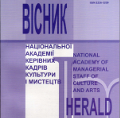КОМПЕНСАТИВНИЙ ЕСТЕТИЗМ ВИКОНАННЯ ЕКСПРЕСІОНІСТСЬКИХ КОМПОЗИЦІЙ ДЛЯ ФОРТЕПІАНО А. ШЕНБЕРГА ТА А. БЕРГА
COMPENSATORY AESTHETICISM OF PERFORMANCE OF EXPRESSIONIST COMPOSITIONS FOR PIANO BY A. SCHOENBERG AND A. BERG
Author(s): Daria AndrosovaSubject(s): Music, Aesthetics
Published by: Національна академія керівних кадрів культури і мистецтв
Keywords: aestheticism; compensatory musical expression; symbolism; expressionism; style in music; performance style; musical genre;
Summary/Abstract: The purpose of this paper is to analyse piano compositions by A. Schoenberg (Six pieces, Op. 19) and A. Berg (Sonata, Op. 1) in the context of a performance reading based on the symbolist aestheticism of expressing the reviving string-plucking analogy of the keyboard-piano expression. The methodological basis is the intonation approach of B. Asafiev’s school in the works of Ukrainian musicologists, including T. Verkina, O. Kozarenko, I. Lyashenko, O. Markova, O. Sokol and others, using research methods of comparative-stylistic, hermeneutical, biographical-descriptive, and analytical-typological. The scientific novelty lies in the originality of the observation of the compensatory aestheticism of the performance perspective of the above music by A. Schoenberg and A. Berg and the correspondence of the latter to the neo-symbolist tendencies of contemporary creative thinking. Another independent conclusion is the nature of this performing choice, which meets the audience's expectations and is correlated with the game-mosaic worldview of our time to exclude dramatic and tragic angles of the content of the musical classics. Conclusions. The neo-symbolist eclecticism of the post-avant-garde revived the keyboard string-plucking analogy in piano sound production, giving pianistic expression a salon-like spiritualised "lightness" that reoriented the expressionist-salon tendencies of the piano heritage of the Novovidenians to a compensatory aestheticism of pro-symbolist meaning. The reality of performing compositions by A. Schoenberg and A. Berg is that the music of their works, including those performed by the author of this essay, approaches the character of salon cordiality of sound, which rejects expressionist anti-aestheticism in favour of pro-Schubertian greetings of the post-post-avant-garde.
Journal: Вісник Національної академії керівних кадрів культури і мистецтв
- Issue Year: 2023
- Issue No: 2
- Page Range: 122-127
- Page Count: 6
- Language: Ukrainian

